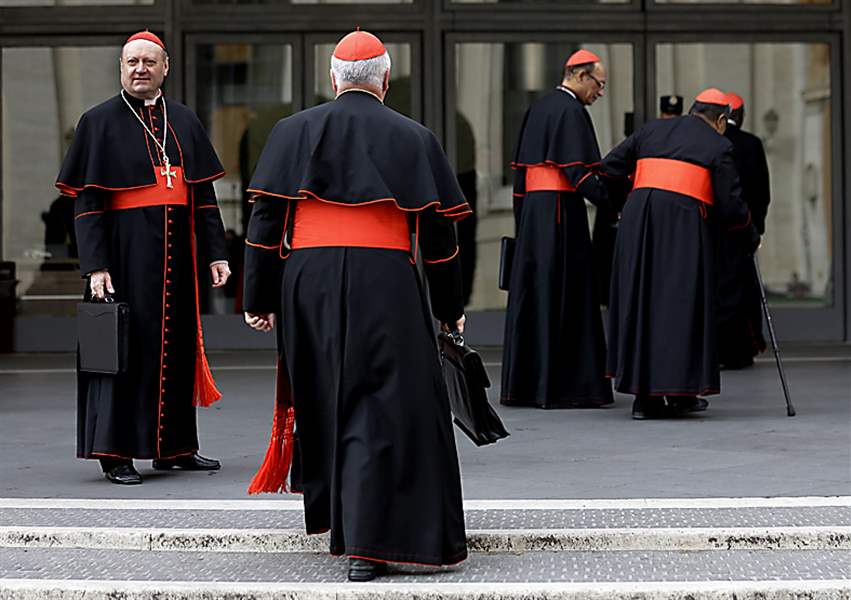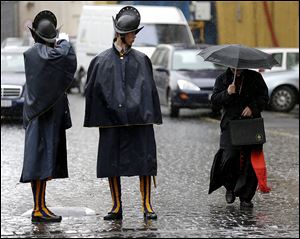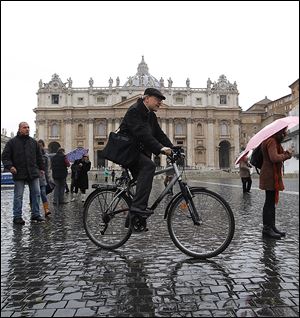
Conclave to choose next pope to begin Tuesday afternoon
Some cardinals reported to be at odds over process
3/9/2013
Cardinal Gianfranco Ravasi, left, joins other cardinals as he arrives at the Vatican. The cardinals plan to keep meeting before the start of Tuesday’s papal conclave.
ASSOCIATED PRESS

Cardinal Gianfranco Ravasi, left, joins other cardinals as he arrives at the Vatican. The cardinals plan to keep meeting before the start of Tuesday’s papal conclave.
VATICAN CITY — The conclave to elect a successor to Pope Benedict XVI will begin Tuesday afternoon, after a morning Mass in St. Peter’s Basilica.

A cardinal leaves after a meeting at the Vatican, which announced the conclave would start Tuesday.
The precise times haven’t been set.

French Cardinal Philippe Barbarin crosses St. Peter's Square after a meeting. Since Monday, cardinals have spoken on what they want to see in the next pope.
The cardinals will enter the conclave just 12 days after Benedict abdicated, taking advantage of his last-minute rule change that gave them the option of starting earlier than the previously required 15 days after the papacy was vacated.
About 150 cardinals have been meeting since Monday to give short speeches on what qualities they want to see in the next pope. Only 115 of them are younger than 80 and therefore eligible to vote. They will meet again today.
More than 100 cardinals have given short speeches, according to the Vatican spokesman, the Rev. Federico Lombardi, who attends the meetings and is permitted to give vague summaries.
On Friday, the topics included inter-religious dialogue, bioethics, social justice, the importance of proclaiming God’s love and mercy, collegiality — the relationship among bishops — and the role of women in the church.
Father Lombardi did not elaborate on any of those topics. But he arrived at the news conference with a large bouquet of flowers that he presented to a female reporter in honor of International Women’s Day. As is customary on that day, “the Holy See offers flowers to many of the different women working there,” said Father Thomas Rosica, who gives summaries of the Italian news conference in English and French.
The meetings of the cardinals have been formal, with cardinals signing up to give five-minute speeches on the topic of their choice.
There had been reports that many cardinals wanted a different process, used by some religious orders to identify potential new superiors, in which they would work the room having 10-minute, one-on-one conversations on what the church needed and who might make a good pope. That apparently did not happen during the official meetings.
But Father Lombardi and — before a media blackout — Cardinal Donald Wuerl of Washington, D.C., pointed out that there were long coffee breaks when the cardinals could speak informally.
With 115 electors, 77 votes will be required for the two-thirds majority.
At this point in the run-up to the 2005 conclave, the Italian newspapers reported a big push for Cardinal Joseph Ratzinger, who was then elected and became Benedict XVI. This time there is reportedly more tension, particularly between the traditionally powerful Vatican cardinals and many of the diocesan cardinals who want to see the Vatican bureaucracy reformed.
According to two Italian newspapers, La Stampa and La Repubblica, Cardinal Angelo Sodano, dean of the College of Cardinals and the former secretary of state, is backing two South Americans for pope and secretary of state. Both worked for many years in the Vatican.
For pope, he and some other Vatican cardinals are said to back Cardinal Odilo Pedro Scherer, 63, of Sao Paolo, a Brazilian of German heritage who worked in the Vatican’s Congregation for Bishops from 1994 to 2001.
As his secretary of state, they reportedly would like to see Cardinal Leonardo Sandri, 69, an Argentinian of Italian heritage who was the former “substitute,” or chief of staff, at the Vatican and most recently headed its office for Eastern Churches.
Cardinal Sandri also may be a papal contender in his own right.
But American and European cardinals who want to see a major overhaul of the Vatican bureaucracy are reported to be giving serious consideration to Cardinal Angelo Scola, 71, of Milan, an intellectual heavyweight known for his dialogue with Muslim leaders, who has never held a full-time post at the Vatican.
The newspapers suggest that if there is impasse between the Scherer and Scola camps, other candidates may emerge. They suggest the leading contenders would be Cardinal Peter Erdo of Hungary, 60, who was twice elected president of the European Bishops’ Conference, and Cardinal Marc Ouellet, 68, a Canadian Scripture scholar who was formerly archbishop of Quebec and most recently head of the Vatican’s Congregation for Bishops.
As a dark horse, they suggest Cardinal Malcolm Ranjith of Sri Lanka, a papal diplomat who formerly worked in the Vatican’s Worship Office, where he championed revival of the Latin Mass and excoriated communion in the hand.
All of that remains speculation. Some American cardinals said privately before the news blackout that they considered the election wide open and expected a longer conclave than in 2005. Pope Emeritus Benedict was elected within 24 hours, on the fourth ballot.
Meanwhile, workers were installing electronic jamming devices in the Sistine Chapel to prevent information leaks and applying opaque film onto the windows of the House of St. Martha to prevent outsiders from seeing inside the building.
The latter is a modern guest residence with 128 suites and rooms where the cardinals will sleep during the conclave. Their room assignments will be chosen by lot so they don’t gather in voting blocs, though they are free to sit and speak with whomever they want at dinner.
Suite 201, the VIP suite, is reserved for the new pope after his election. He may have to stay there for several weeks while the papal apartments are unsealed and some renovations are done, Father Rosica said.
The Block News Alliance consists of The Blade and the Pittsburgh Post-Gazette. Ann Rodgers is a reporter for the Post-Gazette.
Contact Ann Rodgers at: arodgers@post-gazette.com or 412-263-1416.